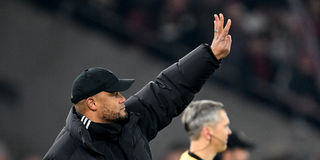Premium
Bayern Munich coach Vincent Kompany speaks on DRC war

Bayern Munich coach Vincent Kompany gestures during their Bundesliga match against VfB Stuttgart at MHPArena in Stuttgart, Germany on February 28, 2025.
What you need to know:
- While football is often considered apolitical, many young players of Congolese descent in Europe have begun speaking out against the decades-long war and insecurity in eastern Congo.
- Former DRC national team captain Youssouf Mulumbu, Real Betis forward Cédric Bakambu, and Trabzonspor’s Simon Banza have been vocal in denouncing what they describe as the world's silence on a conflict that has claimed millions of lives.
The ongoing war in the eastern Democratic Republic of Congo (DRC) is now making waves in European and American sports discussions. This week, Bayern Munich's Belgian coach Vincent Kompany, whose father was born in Bukavu, was asked about the conflict during a press conference.
"I'm 100 per cent Belgian and 100 per cent Congolese. My dad was born in the east of Congo. My grandmother is from Bukavu, in the Kivu region in east of Congo. My simple wish is for people to be able to return to their homes, for people to be able to live a peaceful life," Kompany stated.
"My heart is 100 per cent Congolese and my thoughts and best wishes goes out to the families who are suffering there at the moment," he added.
While football is often considered apolitical, many young players of Congolese descent in Europe have begun speaking out against the decades-long war and insecurity in eastern Congo.
Former DRC national team captain Youssouf Mulumbu, Real Betis forward Cédric Bakambu, and Trabzonspor’s Simon Banza have been vocal in denouncing what they describe as the world's silence on a conflict that has claimed millions of lives.
For Kompany, the issue is particularly personal. As the coach of Bayern Munich, he is also connected to the club’s ongoing partnership with Rwanda.
In early February, Congolese Foreign Minister Thérèse Kayikwamba wrote to Bayern Munich, Arsenal, and Paris Saint-Germain (PSG), urging them to end their sponsorship agreements with "Visit Rwanda," citing concerns that the deal may be linked to the illegal exploitation of minerals from conflict zones in the DRC.
The letter stated that "Rwanda's culpability" in the conflict had "become indisputable after a UN report revealed the presence of 4,000 Rwandan soldiers active in the DRC." The Foreign Minister further condemned the ongoing humanitarian crisis, emphasizing that:
"Thousands of people are currently trapped in the city of Goma with limited access to food, water, and security. (...) Countless lives have been lost; rape, murder, and theft predominate. Your sponsor is directly responsible for this misery. If not for your own conscience, then clubs should do it (end their sponsorship agreement) for the victims of Rwandan aggression."
Rwanda has repeatedly denied direct involvement in the conflict and dismissed allegations that it supports the M23 rebel group.
"Visit Rwanda" has been Arsenal’s sponsor since 2018, in a deal worth over €12 million per year. PSG signed a similar agreement in 2019, running until 2025 and bringing in about €15 million annually. Bayern Munich joined in 2023 with a five-year partnership for football development and tourism promotion. A similar appeal was made to NBA Commissioner Adam Silver, urging reconsideration of the league’s ties with Rwanda.
So far, none of the clubs have publicly responded to the DRC's request. Bayern Munich has sent two employees to Rwanda to monitor the situation and is in communication with the German Foreign Office.
Meanwhile, violence in North and South Kivu has intensified. M23 rebels have expanded their control, with fierce fighting in Goma leading to 8,500 deaths by the end of January, according to the Congolese government.
As the conflict continues to escalate, its impact is now reaching the global stage—not just in politics and diplomacy, but also in the world of sports.




